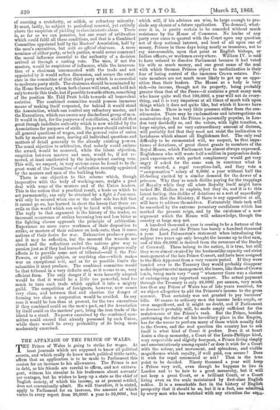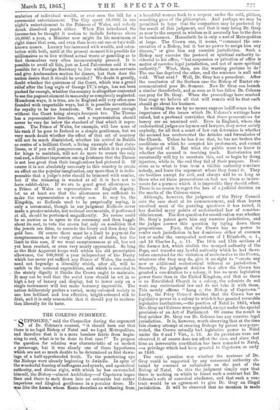THE APPANAGE OF THE PRINCE OF WALES.
THE Prince of Wales is going to strike for wages. At least journals which are supposed to know all political secrets, and which really do know much political tittle-tattle, affirm that an application is to be made to Parliament this session for an increase to his allowances. The Prince is not in debt, as his friends are careful to affirm, and not extrava- gant, witness his circular to his tradesmen about servants' per centages, but he wishes to keep up a state as the chief of English society, of which his income, as at present settled, does not conveniently admit. He will therefore, it is stated, apply to Parliament for an increase, the amount of which varies in every report from 20,000/. a year to 50,0001., but which will, if his advisers are wise, be large enough to pre- clude any chance of a future application. The demand, what- ever it is, is pretty certain to be conceded without much resistance by the House of Commons. No leader of any party ever cares to quarrel with the Court upon any question, not of deep national interest, and least of all upon one or money, Princes in these days being nearly as tenacious, not to- say unreasonable, upon that point as English bishops, or Indian officers, or workmen everywhere. William IV. is said to have refused to dissolve Parliament because it had voted his wife so much money, and one great cause of the zeal with which German Princes object to mediatization is their- fear of losing control of the immense Crown estates. Pri- vate members are not much more likely to get up an oppo- sition than their leaders. The Rouse as a body is very- rich—its income, though not its property, being probably greater than that of the Peers—it contains a great many men who know quite well that 100,000/. a year will not do every- thing, and it is very impatient at all times of much talk upon, things which it does not quite like, but which it-knows have. to be done. There is very little pressure either from the con- stituencies. There may be exclamations and interrogations on nomination-day, but the Prince is personally popular, in Lon- don very decidedly so, and the voters, with light taxation, a large surplus, and no very extraordinary amount of distress, will probably feel that they, need not resist the inclination to lavishness which almost all Englishmen feel. The only real" difficulty to be surmounted will, we suspect, be that impa- tience of dotations, of great direct grants to members of the Royal House, which Parliament has almost always expressed: Englishmen who will waste half a million in purposeless dock- yard experiments with perfect complacency would get very- angry if asked for the same sum to construct what is really wanted, a regal reception-hall, and they vote a " compensation " salary of 9,000/. a year without half the- ill-feeling excited by a similar demand for the dower of a princess. Why they so much dislike paying for the trapping of Royalty while they all adore Royalty itself might have- tasked Mr. Hallam to explain, but they do, and it is to this, latent feeling, this dislike of dotations as a sort of superfluity of waste, that the Ministry, if there is any opposition at all, will have to address themselves. Fortunately their task with be smoothed by the extreme pecuniary carefulness which has marked the present reign, and by the existence of a new argument which the Rouse will acknowledge, though the country at large may not.
A hundred thousand a year is ceasing to be a fortune of the very first class, and the Prince has barely a hundred thousand' a year. Lord Palmerston's statement when introducing the.
subject two years ago only brought the income up to that slime., and of this 60,000/. is derived from the revenues of the Duchy' of Cornwall. These belong to the nation, it is true, but still they were almost created by the businesslike capacity and strict. management of the late Prince Consort, and have been assigned to the Heir Apparent from a very remote period. If they were- handed over to the Treasury they would probably disappear under departmental management, the leases, like those of Crown, lands, being made very " easy " whenever there was a chance- .
of endangering any important support. The actual payment through the Treasury is only 40,000/. per annum, very much less than any Prince of Wales has of late years received, for we object altogether to add the Princess's income to the gross account. That certainly was not granted to pay butchers' bills. Of course to ordinary men the income looks ample, or- even magnificent, and it might no doubt, and if Parliament so decrees it probably will, be made amply sufficient for the maintenance of the Prince's rank. But the Prince, besides performing the duties of his hereditary place in the Empire, has for the nonce to perform many of those which usually fall to the Crown, and the real question the country has to ask itself is what kind of Court it prefers. Does it at heart desire a cheap monarchy, a Court of the Louis-Philippe kind, very respectable and slightly bourgeois, a Prince living simply and unostentatiously among equals? or does it with for a Court with the colour, and movement, and splendour, and visible magnificence which royalty, if well paid, can secure ? Does it wish for regal ceremonial or not? That is the true- point to be decided. Ninety thousand a year will keep. a Prince very well, even though he happens to live in London and to be heir to a great monarchy, but it with not keep a great Court, er a brilliant Court, or a Court living even on the scale maintained by first-class English nobles. It is a remarkable fact in the history of English prosperity that it should be so, but it is a fact, one adraittea by every man who has watched with any attention the ease,- mulation of individual wealth, or ever seen the bill for a ceremonial entertainment The City spent 50,000/. in one night's entertainment to the Princess of Wales, and nobody drank dissolved pearls either. When Pitt introduced the income-tax he thought it useless to include fortunes above 50,000/. a year, a Minister now might fix his maximum at eight times that sum, and even then leave out one or two well- known names. Luxury has increased with wealth, and osten- tation with both, until at the present moment it is possible for millionaires so to live without actual waste or gambling as to find themselves very often inconveniently pressed. It is possible to avoid all this, just as Lord Palmerston said it was possible for a Foreign Secretary to live without men-servants and give Ambassadors mutton for dinner, but then does the nation desire that it should be avoided ? We doubt it greatly, doubt whether the quietness of the Court, which was a grand relief after the long orgie of George IV.'s reign, has not been pushed far enough, whether the country is altogether contented to see the pageant element in monarchy so completely neglected. Humdrum ways, it is true, are in England still very often con- founded with respectable ways, but it is possible nevertheless for royalty to be too humdrum. We are bourgeois enough without the Court being always bourgeois too. The Throne has a representative function, and a representation should never be very far below the standard of that which it repre- sents. The Prince of Wales, for example, will lose none of bis rank if he goes to Ireland as a simple gentleman, but we very much doubt whether the effect of that act of courtesy will not be much diminished, whether his arrival in Dublin as centre of a brilliant Court, a living example of that state- liness, or if you will pompousness, of life which it is possible for kings to maintain, will not do more to secure the only real end, a distinct impression among Irishmen that the Throne is not less great than their imaginations had pictured it. Of course it is not. absolutely necessafy in this country to create an effect on the popular imagination, any more than it is indis- pensable that a judge's robe should be trimmed with ermine, but if the trimming is wanted at all it is best not to have rabbit-skins. If we are to grant great allowances to a Prince of Wales as representative of English dignity, let us at least see that the allowances are, sufficient to make the representation a worthy one. It may be, the Kingship, as Radicals used to be perpetually saying, is only a ceremonial, though in our judgment Radicals never made a greater mistake, but national ceremonials, if performed at all, should be performed magnificently. No course could be so unwise as to agree to the ceremony and then haggle about its cost, to vote the crown but only on condition that the jewels are false, to concede the livery and then deny the gold lace. Of course there must be a limit to payment for sumptuousness, as for every other object of desire, but the limit in this case, if we want sumptuousness at all, has not yet been reached, or even very nearly approached. So long as the Heir Apparent keeps well within the old prescriptive allowance, the 100,000/. a year independent of the Duchy which has never yet sufficed any Prince of Wales, the nation need not begrudge a liberality which, after all, will be unfelt in the national expenditure, and which is essential to the stately dignity it thinks the Crown ought to maintain. It may not be well that the social tune should be set in so high a key of luxury and display, but to lower only on a single instrument will but make harmony impossible. The nation deliberately prefers a varied, many-coloured society to one less brilliant and less effective, bright-coloured silk to drab, and it is only reasonable that it should pay in modera- tion liberally for its taste.































 Previous page
Previous page